Sustainability
Respecting Human Rights
Basic Approach
Concerning respect for human rights within NGK Group business activities, our relationship with employees has been governed by the NGK Group Corporate Business Principles and Code of Conduct, and our relationship with suppliers has been governed by the NGK Group Supplier Code of Conduct. In April 2021 we established the NGK Group Human Rights Policy as a separate policy on human rights. This not only clarifies our messaging both inside and outside of the NGK Group, but promotes our efforts to respect human rights.
NGK Group Corporate Business Principles
NGK Group Supplier Code of Conduct
Related Policies and Approaches
Statement on the UK Modern Slavery Act
We have disclosed our UK Modern Slavery Act Statement based on the Modern Slavery Act passed by the United Kingdom in 2015.
UK Modern Slavery Act Statement
Respect for the Human Rights of Children
The NGK Group is aware that there are a variety of impacts that corporations can have on children. In addition to signing the UN Global Compact, we support the Children’s Rights and Business Principles, respect the rights of children through our business activities, and engage in social contribution activities and other efforts to promote children’s rights.
Social Contribution Activities
Compliance with Local Labor Laws
The NGK Group complies with the laws of each country and region concerning labor and occupational safety and health.
We have also established a reporting mechanism for whistleblowing and consultation to handle possible violations.
Regarding child labor and forced labor, we use sources such as official public documents to confirm the age of candidates before they are hired. And we do not impose unreasonable restrictions on the access to workplaces and other facilities, such as dormitories and residences, provided by the company, as well as the freedom of movement within such facilities.
To date, we have found no cases of child labor or forced labor through the regular surveys.
NGK Group Supplier Code of Conduct
The NGK Group respects the human rights of all stakeholders affected by our business activities. In addition to education and training for our employees, we also communicate this commitment to all stakeholders, seeking their understanding and cooperation. Specifically, regarding respect for human rights in our supply chains, we expect our suppliers to comply with our human rights policy and thoroughly implement the NGK Group Supplier Code of Conduct. This code outlines specific measures related to human rights, including the prohibition of discrimination, forced labor, and child labor, as well as considerations for appropriate wages and working hours.
We periodically request our primary suppliers to consent to compliance with this code when initiating new transactions or continuing existing ones.
NGK Group Supplier Code of Conduct
Management Framework
In April 2020, we established the HR Committee as a cross-sectoral, deliberative body chaired by the Director responsible for the Human Resources Department and tasked with ensuring that corporate activities have a stronger focus on human rights and that important personnel issues are addressed by the NGK Group as a whole.
The Director responsible for the Human Resources Department, Director responsible for the Sustainability Management Department, General Manager of the Human Resources Department, the General Manager of the Sustainability Management Department, and the managers of each department work to promote initiatives that ensure respect for human rights. They coordinate and cooperate with related committees and departments on such initiatives, according to their content and importance. Meanwhile, the director responsible for the HR department regularly reports to the Board of Directors concerning the status of their implementation, and the Board of Directors oversees the status of implementation.
Organizational Structure Chart
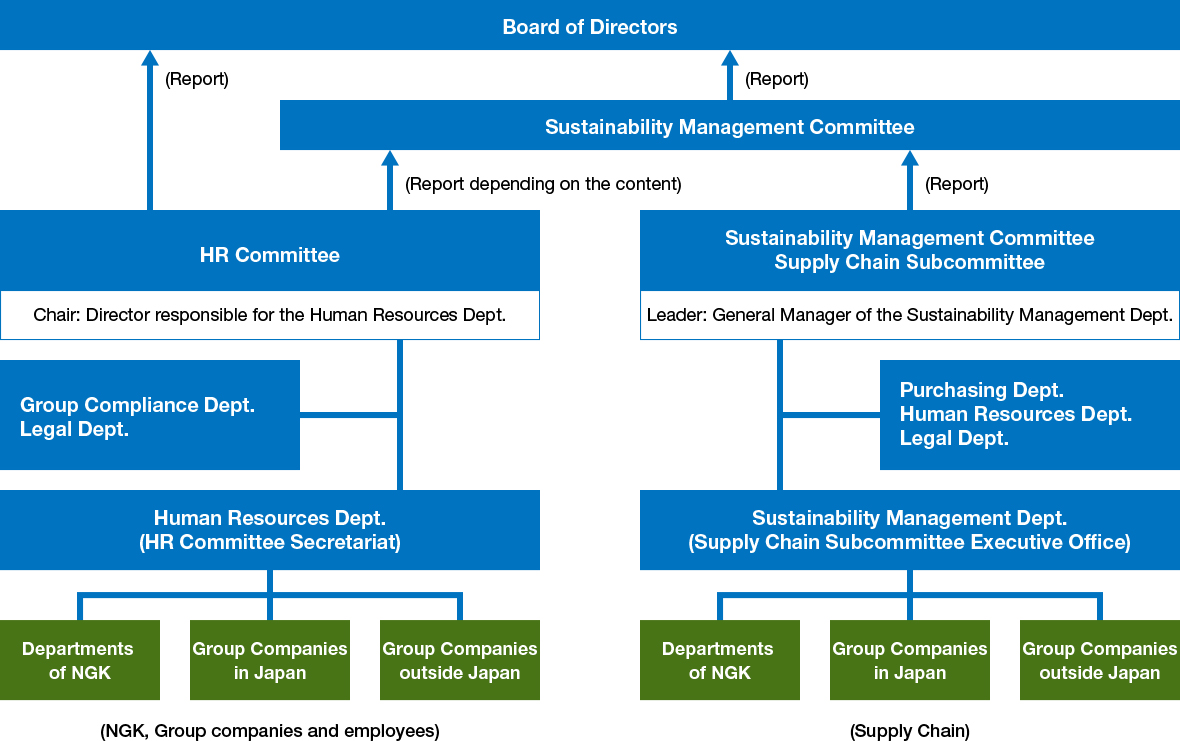
Overall Picture of Initiatives for Respect for Human Rights
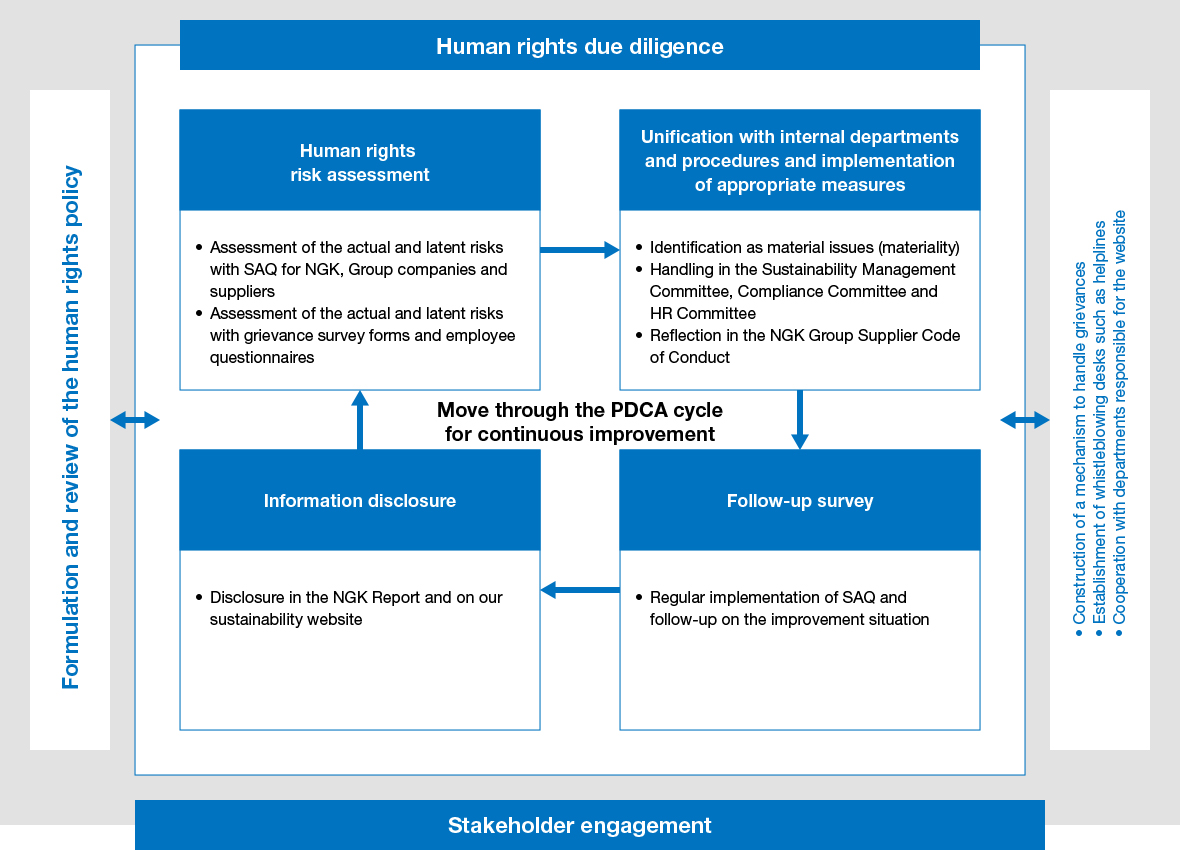
FY2024 Activities
In FY2024, we focused on the following human rights initiatives.
| Implementation Timing | Details of Implementation |
|---|---|
| April to June | Investigated human rights related grievances in all Group companies in and outside Japan during the second half of FY2023 (human rights related grievances at NGK headquarters are investigated and recorded on a case-by-case basis) |
| September | Disclosed Statement on the UK Modern Slavery Act (fiscal year ended March 31, 2024) |
| October to November | Investigated human rights-related grievances at Group companies in and outside Japan during the first half of FY2024 (human rights related grievances at NGK headquarters are investigated and recorded on a case-by-case basis) |
| December 2024 to March 2025 | Conducted human rights due diligence surveys (SAQ*) for all of NGK and our Group companies in and outside Japan |
| March 2025 | Conducted e-learning program on the subject of the “NGK Group Code of Conduct Guidebook ‘2. Respecting Human Rights’” Carried out stakeholder engagement with foreign employees of Group companies in Japan (both full-time and temporary employees) |
Self-Assessment Questionnaire concerning corporate social responsibility
Human Rights Due Diligence
Human Rights Risks Accompanying Group Business Activities
NGK regularly conducts a self-assessment survey based on the RBA* Code of Conduct on ourselves and our Group companies in and outside of Japan. In FY2024, a total of 38 companies including NGK underwent the self-assessment survey with a total of 55 questions in the three categories of labor, health and safety, and ethics. Conducting this survey gives us a comprehensive overview of the business activities in our group and identifies human rights issues.
As a result, no violations of the laws or regulations of each country were found. On the other hand, we confirmed multiple instances of issues which, while legal, do not comply with the RBA Code of Conduct. Based on these results, we revised our work regulations in FY2024 and deleted “reduction of salary” from the types of penalties listed. Going forward, we will consider our response while taking into account the laws/ordinances, customs and practices of each country.
Responsible Business Alliance: Focusing primarily on the electronic equipment industry, the RBA establishes standards and conducts audits with the aim of promoting safe working environments, worker protection, and environmental responsibility.
Human Rights Risks to Employees
Concerning human rights risks to employees, we accept reports and queries about human rights through our internal whistleblowing desk, and receive reports from Group companies once every 6 months through the Human Rights Grievance Survey or the Legal Risk Management Report. In FY2024, we received 42 reports related to human rights (harassment, labor-related, etc.) from the entire NGK Group. We are handling these with fact-finding investigations, rectification, instruction, and warnings. Once every two years we also conduct a Corporate Risk Survey (CRS) to identify latent risks.
Human Rights Risks to Supply Chain
We periodically request our primary suppliers to comply with the NGK Group Supplier Code of Conduct when initiating new transactions or continuing existing ones.
NGK Group Supplier Code of Conduct
Human Rights Issues Requiring Our Attention
We drafted a long list based on the basic human rights that the UN Guiding Principles say are the responsibility of companies to respect, organized our value chain, and identified human rights issues related to our business. In addition to investigating human rights incidents that have manifested in our industry, we conducted country risk investigations to ascertain latent risks related to our business. Next, in line with the concepts laid out in OECD Due Diligence Guidance for Responsible Business Conduct (RBC), we assessed importance along the two axes of “severity” and “likelihood of occurrence.” We then plotted these human rights issues on a risk map for each stakeholder through interviews with representatives of our business divisions. Moreover, we identified the human rights issues that we should tackle first through discussion between related parties and a report by the HR Committee. We are prioritizing handling of these human rights issues, and working to prevent and correct such human rights issues. We also consider changes in the business environment and the opinions of stakeholders, and continually revise our human rights risk map.
- Overwork and long working hours
- Occupational safety and health
- Forced labor
- Child labor
- Preservation of the local living environment (relocation of residences without consent, emissions of pollutants, noise, vibrations, etc.)
- Safe use of products
- Bribery and corruption
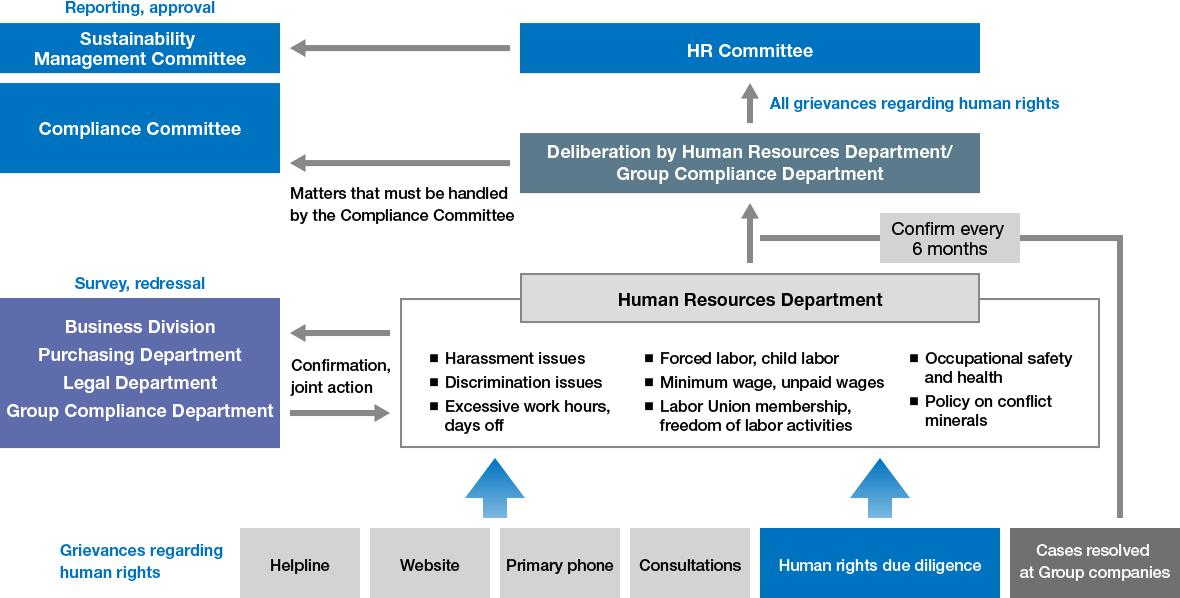
Engaging with Stakeholders
The NGK Group has identified human rights risks in our business activities, organized the stakeholders in our value chain, and selected those to prioritize engaging with in order to properly handle these risks. In FY2024, we ascertained the state of our business, and interviewed one full-time employee and one temporary employee who have foreign citizenship from one of our Group companies in Japan. As a result, we found that the Group company in question has been striving to create an environment that is safe and easy to work in, and while there is room for improvement, there were no major issues directly related to human rights risks.
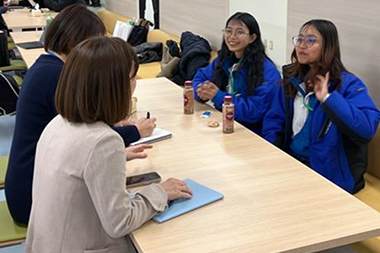
Grievance Mechanisms
NGK has established a whistleblowing desk (helpline) which can be used by everyone who works at NGK, our Group companies in Japan, and each of our sites. Our internal and external help desks are able to accept anonymous inquiries and reports. At the same time, we are striving to protect those who make inquiries and whistleblowers so that they are not treated unfavorably as a result of making an inquiry or report. We are establishing effective whistleblowing structures in our Group companies outside Japan. For example, our Group companies are establishing mechanisms to receive inquiries and reports which can be used by everyone working there to suit the actual circumstances in their countries.
Moreover, we have established the Supplier Helpline to accept inquiries and reports from suppliers. Together with this, we are capable of receiving inquiries and reports from all our stakeholders through the Contact page on the NGK website.
Contact Page on the NGK Website
When we receive an inquiry or report relating to human rights, the Human Resources Department provides remedies for the affected parties if we confirm human rights have been affected upon discussions with the Group Compliance Department and other related departments. Together with this, the Human Resources Department takes corrective and preventative measures. It then makes reports to the Compliance Committee, HR Committee and Sustainability Management Committee as necessary depending on the degree of importance about our response to those issues.
Grievance Mechanisms and Remediation / Remedy Framework
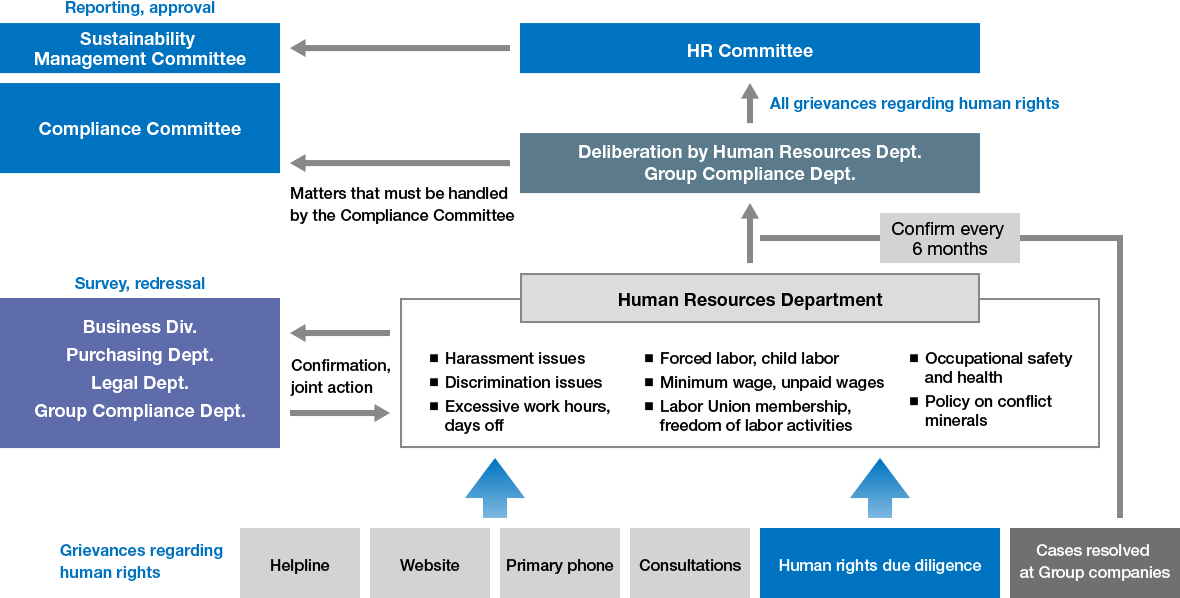
Education Concerning Human Rights
NGK conducts various types of training, through seminars and e-learning, for executives and all employees, with the goal of improving their level of understanding for respecting human rights in our corporate activities.
| Category | Theme | Participants / Applicable Range | Number of Participants | Implementation Timing |
|---|---|---|---|---|
| Human rights in general | “NGK Group Code of Conduct Guidebook ‘2. Respecting Human Rights’” e-learning program Corporate responsibility to respect human rights, human rights related risks | All officers and employees working at NGK, and our Group companies in and outside Japan (including contract employees, re-hired employees, re-contracted employees, temporary employees, subcontractors, employees seconded from Group companies and part-time employees) | Survey replies: 4,619 | April 2024 |
| Human rights in general | Respect for human rights, NGK’s initiatives, and ESG risks and opportunities | Newly appointed managers, those promoted within managerial positions, career recruits in managerial positions | 133 | December 2024 |
| Human rights in general | NGK Group Corporate Business Principles Realization of a sustainable society through business activities, respect for human rights, and thorough compliance |
Employees promoted as those in general positions, career recruits with eligible qualifications, new employees | 571 | April 2024 to March 2025 |
| LGBT | “Introduction to LGBT: Aiming for a Worker-friendly Workplace” Basic LGBT knowledge and internal initiatives |
New employees | 175 | April 2024 |
| Harassment | Definitions of workplace bullying and sexual harassment, concrete examples, treatment in workplace regulations, helpline introduction, and promotion of understanding through case studies | New employees, employees promoted as those in general positions, and mid-career recruits with the eligible qualifications | 571 | April 2024 to March 2025 |
| Harassment | Compliance, workplace bullying and sexual harassment in manufacturing sites | New section chief training | 20 | July to December 2024 |
| Harassment | Lawyer-led seminar “Understanding and techniques for preventing harassment—For better communication—” | Officers and employees of NGK and Group companies in Japan | 504 | August to December 2024 |
